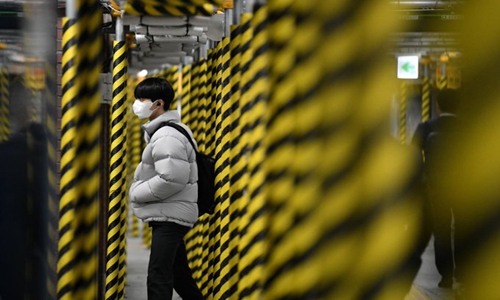HOME >> SOURCE
SK firms in China get back to business while contamination fears affect movement of goods
By Ma Jingjing and Zhang Dan Source:Global Times Published: 2020/2/27 18:37:14
Exports to China may decline, supply chain disrupted

File photo
South Korean-invested firms in China have started manufacturing or are making preparations to do so, without much impact from stricter rules preventing cross-border virus spread amid a rapid rise in novel coronavirus infections in South Korea.However, fears over the virus spreading via packages shipped from South Korea have led to a slump in cosmetics imports by Chinese firms.
As some Chinese cities have imposed stricter rules on screening new foreign visitors this week, worries have arisen that South Koreans stranded in their home country may impede the operations of South Korean firms in China.
Several South Korean companies in Qingdao, East China's Shandong Province - a popular destination for South Koreans - said on Wednesday they have started manufacturing or are making preparations to do so, seeing no impact from the city's stricter epidemic prevention measures covering foreign visitors.
South Korean cutting tool manufacturer YG-1 Corp's China branch in the Qingdao free trade port area told the Global Times that the company, with 900 employees, resumed production on February 10, with 80 percent of the staff having come back to work.
"We have 16 South Korean staff in our Qingdao facility, and 10 returned to their hometowns during the Spring Festival holiday but came back to China on January 28," the company said, adding that only two or three of them work onsite while the rest work from home.
Generally, South Koreans who work in Qingdao come back to China on the sixth or seventh day of the first lunar month and therefore the deteriorating epidemic situation in South Korea is unlikely to affect the normal operation of these firms in China, a Chinese representative of South Korea-funded Qingdao Clearview Medical Technology Co told the Global Times.
Qingdao began to arrange for designated vehicles to pick up all foreign visitors arriving in Qingdao and send them to their homes or designated hotels for a 14-day mandatory quarantine to contain the cross-border spread of the virus.
Qingdao's neighboring city Yantai announced Wednesday it will provide free nucleic acid test kits for foreign visitors, with those testing abnormal to be sent to designated hospitals for treatment.
Logistics, industry chain
Since the outbreak developed in China and South Korea, bilateral people and goods exchanges have borne the brunt.
As of Monday, the total number of flights between the two countries was only 37 percent of the amount approved before, while the number of cargo flights plunged nearly 70 percent, data from South Korea's Ministry of Land, Infrastructure and Transport showed.
South Korean diagnostic reagents producer Boditech Med Inc has a research and development (R&D) center in Qingdao and the head of the center didn't come back to China before Qingdao imposed the stricter rule.
An administrative staffer at the R&D facility surnamed Min told the Global Times on Wednesday that "our Korean manager usually keeps in touch with us via phone or email, and therefore whether he returns or not has little impact."
In the meantime, a large agency handling South Korean cosmetology products in Beijing told the Global Times on Thursday that goods deliveries from South Korea have slowed markedly, while the company plans to postpone procurement until the end of March.
"Although the goods sent from South Korea will be disinfected, we're afraid consumers may still have concerns of possible virus spread," a manager of the agency said.
He predicted the firm's sales of the cosmetic products from South Korea are expected to tumble 65 percent in the first quarter.
In addition, the global semiconductor supply chain will be disrupted if the outbreak in South Korea lasts, as South Korea producers including Samsung and SK Hynix hold a dominant position in the global DRAM memory chip market, said Xiang Ligang, a telecom industry expert.
"Theoretically, Chinese semiconductor manufacturers may benefit, but production capacity is limited by labor shortages," a staffer at Hangzhou Silan Electronics Co told the Global Times. He said the company has sent buses to pick up workers at villages and they have to be quarantined in designated hotels for seven to 14 days before returning to factories.
The price of DRAM memory chips may rise sharply, Xiang said.
Moreover, the deteriorating outbreak situation will not impact Chinese investors too much, as Chinese investment in the country had slowed after the US Terminal High Altitude Area Defense system was deployed in South Korea in 2016, a Chinese real estate investor told the Global Times on Thursday.
Newspaper headline: SK firms in China get back to business
Posted in: COMPANIES